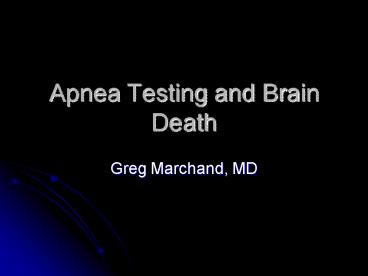Apnea Testing and Brain Death - PowerPoint PPT Presentation
1 / 5
Title:
Apnea Testing and Brain Death
Description:
A determination of brain death must be made in accordance with accepted medical standards. ... This time becomes the time of legal death declaration. ... – PowerPoint PPT presentation
Number of Views:1233
Avg rating:3.0/5.0
Title: Apnea Testing and Brain Death
1
Apnea Testing and Brain Death
- Greg Marchand, MD
2
Sample Definition of Brain Death
- Definition of Brain Death varies by State
- California
- An individual who has sustained either (1)
irreversible cessation of circulatory and
respiratory functions, or (2) irreversible
cessation of all functions of the entire brain,
including the brainstem, is dead. A determination
of brain death must be made in accordance with
accepted medical standards.
Benzel EC, Gross CD, Hadden TA, et al. The apnea
test for the determination of brain death. J
Neuro-surgery 198971191-194
3
Sample Documentation
- The patient must undergo two brain death
determinations, at least three hours apart, and
meet all criteria listed below. - The two examinations must be performed by
different licensed physicians the first exam by
any (including house staff), the second exam only
by an attending physician not part of the primary
team (i.e. a neurosurgeon, neurologist or
internist if the patient is admitted to the
Trauma Surgery service). - If the patient meets all criteria for brain death
on both examinations, this should be noted in the
medical record at the time of the second exam.
This time becomes the time of legal death
declaration.
Benzel EC, Gross CD, Hadden TA, et al. The apnea
test for the determination of brain death. J
Neuro-surgery 198971191-194
4
Sample Brain Death Criteria
- Brain Death Criteria vary by Hospital
- 1. No spontaneous movements and no response to
deep painful bilateral stimuli - 2. Core temperature 35 C
- 3. Sedatives, paralytic agents, exogenously
ingested substances (ETOH, cocaine, heroin)
withheld for a period - sufficient to exclude them as a cause coma.
- 4. A phenobarbital level laboratory assay.
- 5. Apnea as determined by the apnea test (see
below). - 7. Absence of all brain stem reflexes.
Benzel EC, Gross CD, Hadden TA, et al. The apnea
test for the determination of brain death. J
Neuro-surgery 198971191-194
5
Sample Testing Protocol
- 1. Ventilate the patient with FiO2 of 1.0 at a
rate and tidal volume to achieve eucapnea on
arterial blood gas determination (pCO2 35 - 45
torr). - 2. Keeping the patient on FiO2 of 1.0, set the
ventilator rate to zero. CPAP may be used for
this. Inactivate back-up apnea rate (i.e. do not
allow the ventilator to override apnea). - 3. Observe patient's chest closely for 10 minutes
for signs of spontaneous breathing. - 4. Obtain ABG at the end of the 10 minute period
if no spontaneous breaths are observed. If
patient breathes he/she has "passed" the apnea
test and cannot be considered brain dead. - 5. If the patient does not breathe, and the 10
minute ABG pCO2 exceed 55 torr, the patient has
"failed" the apnea test. If the 10 minute ABG
pCO2 does not reach 55 torr, repeat the test but
wait longer than ten minutes (try 15 minutes)
before obtaining the ABG. - 6. In patients with underlying COPD and baseline
CO2 retention, adjust the baseline FiO2 so as to
bring initial PaO2 into the 60-80 torr range. - Terminate the apnea test prior to 10 minutes if
(a) the patient has spontaneous respiratory
efforts or (b) the patient becomes profoundly
hypoxic (O2 saturation or (c) the patient becomes hemodynamically
unstable.
Benzel EC, Gross CD, Hadden TA, et al. The apnea
test for the determination of brain death. J
Neuro-surgery 198971191-194































